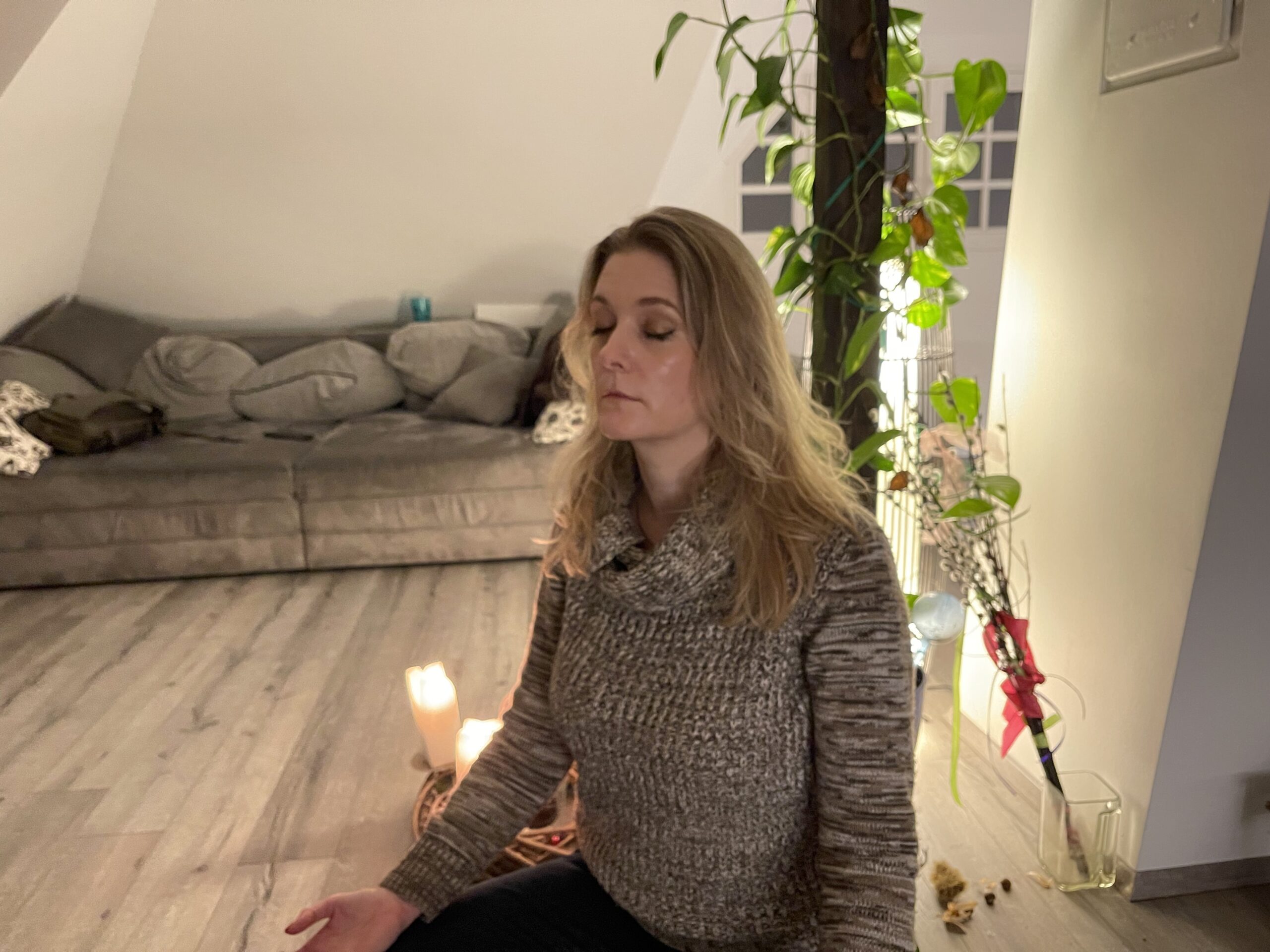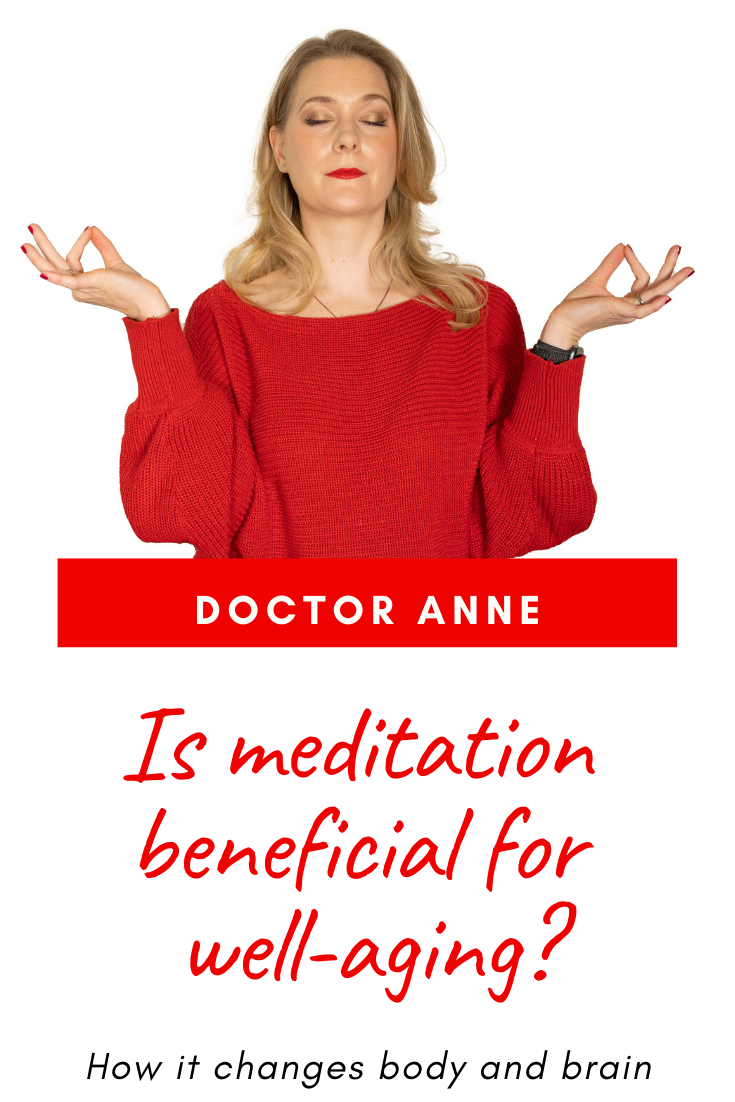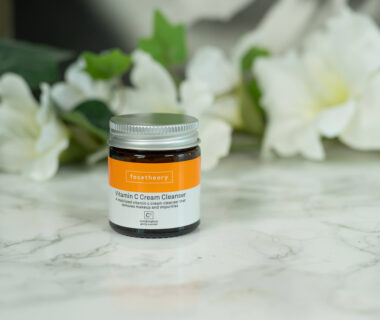Meditation has long been part of different movements that focus on wellness and wellbeing in general, and has even longer been integral part of different religious practices. So it comes as no surprise that over the last years, as studies suggested measurable benefits for overall health, meditation became something like the mindful magic bullet helping to cure everything from anxiety to aging.

But is there actually more to it than hyped up expectations? Is meditation helpful in aging well and is it something you – and I – should make part of our daily routines in our aim to age the best we can?
The answer is, as always, complex, so let’s take a closer look.
What is meditation?
Meditation usually refers to a formal practice that can calm the mind and enhance awareness of ourselves, our minds and our environment. It comes under the umbrella of mindfulness exercises, with mindfulness being a slightly broader and less formal concept. Formal meditation can be done many different ways, with mindfulness of breathing, the use of mantras or phrases for focus, so called loving kindness meditation or more movement based forms like walking meditation or Tai Chi being the ones best known.
Where does meditation come from and why does it matter?
Meditation has been mentioned in the Vedas, large bodies of religious texts from ancient India and the oldest scriptures of Hinduism, supposedly written down as early as 1500 BC. Since then meditation has almost exclusively been practiced within different religious belief systems, and it is a very new twist to take it from that context and use it in companies to increase focus and productivity of the workforce, or use it as part of self-centered programs to achieve “a better you” or for well-aging.
That doesn’t mean that you need to be part of a religious group to practice meditation, it just serves as a reminder that by taking one thing out of a complex belief system, you can’t expect to get the exact same benefits, meaning that some of the positive effects we see in people practicing meditation as part of their religious beliefs and as part of a society that as a whole puts a focus on mindfulness won’t be noticeable simply because you focus on your breath for 20 minutes a day.
How meditation changes the brain
With that in mind, and remembering that there are many different types of meditation, which makes it very hard to compare them in studies, let’s look at the measurable changes we see in the brains of people who meditate.
Our brain has different areas that are responsible for different things. One of these areas is called the Default Mode Network, and it is most active when our mind wanders and we are either worrying about the future or dwelling in the past. Increased activity there is associated with unhappiness and in some studies seems to correlate with ADHD and Alzheimers Disease. Meditation decreases the activity there, probably by bringing the wandering mind back to the focus you chose, and with regular practice reduces activity there in general.
To understand why that happens, you have to know about a phenomenon called Neuroplasticity, which means that our brains are able to change their structure depending on which areas are needed most. It is like training a mental muscle, and meditation strengthens the focus-muscle and weakens the mind wandering-muscle and that can be seen as physical changes in the brain. And while we lose brain mass as we age, we never lose Neuroplasticity, meaning we can keep changing our brain even at an old age.
The Default Mode Network is not the only area affected, we see increased activity with meditation in parts of the Prefrontal Cortex, the Cingulate Cortex and the Hippocampus as well as decreased activity in the Amygdala – to go into the different properties of these areas is beyond this blog post though.
It is also worth noting that different studies have shown different effects on different areas, most likely due to different meditation techniques used.
I mentioned before that as we age, our brain mass decreases and we see thinning of the cortex, and this can, in parts, be slowed down by regular meditation. (More info: The five main risks to well-aging) One study compared the brains of people meditating regularly with others from their age group and found that at the age of 50 their brain was much younger in terms of cortex thickness and mass than that of their non-meditating peers.
Now there might be other explanations: Maybe everyone that meditates is a weirdo and has a different brain anyway, or it is because they are more likely to be vegan or they simply live a life that is less stressful so they have the time to meditate, and to rule that out, studies looked at changes in the brain of people taking up meditation and could demonstrate changes in certain areas after a period as short as six weeks.
Again, more mass does not equal more function, so let’s look at the findings regarding measurable changes.

The positive effects of meditation of well-aging
Studies have looked at specific benefits like mental-health, productivity and concentration, but I want to focus on those effects that are related the closest to the actual aging process. As we discussed in the previous video, there are certain imminent risks of aging, and meditation is not able to influence things like muscle mass and bone density, both of which are very important. It does have an effect on the brain though, and this effect not only translates to more mass, but also seems to have a preventative effect on dementia and increases memory function.
If we move away from the brain, studies found that the concentration of stress hormones and inflammatory mediators was lower after meditation, which might have a positive effect on cardiovascular disease. The American Heart Association lists meditation as a possible intervention, but, and I can’t stress that enough, not because there is overwhelming evidence, but because it is easy to access and cheap, so there isn’t much to be lost in trying.
Another thing that is changed when you take blood after meditation is the activity of Telomerase, an enzyme that is responsible for elongating chromosomes, specifically the Telomers, the parts on the very end of the chromosome that get shorter with every cell cycle. I will do a separate post on the function of Telomers and on the effects of inflammation on aging eventually, but for now more Telomerase activity and less inflammatory mediators and stress hormones equal less speedy aging, so it is a good thing.
What isn’t clear though is if more Telomerase activity measured in your blood translates to any actual positive effects in the cells, and the same is true for less measurable inflammation and stress in the blood – less there isn’t proof of any positive changes anywhere else.
Are there dangers to meditation?
Nothing is without danger, not even meditation, although we can say that it has been practiced safely for thousands of years.
I do see a danger though in the way it is marketed right now as the one and only way to a better you, a more relaxed you, a more attentive and healthier and more focussed you. I see a danger in people with depression being told they should stop medication and just meditate instead, and in all the outrageous claims regarding the positive effects it might have.
Yes, meditation does change the brain and our body, and yes, results from studies have been promising, but most studies have had either a small sample size or looked at different techniques, so the research right now is still in its infancy and not as overwhelmingly clear as some people might make you believe.
Apart from that there could be dangers if you are suffering from PTSD or unresolved issues in the past. If that is the case, you should always seek professional help and maybe try meditation under professional guidance.

Do I think meditation is beneficial for well-aging?
Maybe.
I think that incorporating mindfulness practice into our everyday life, be that meditation, yoga or any other form can be beneficial for dealing with stress and help being more present, which in turn might lead to better sleep and less worrying. I am also a fan of not only working my physical body, but also training my brain to focus, either through meditation or through learning a new skill.
If while I do that my risk for cardiovascular diseases lowers and my cells stay younger, all the better – after all it is free of cost and I have spend a lot of money on skincare gadgets in the past with even less studies to back up their effectiveness.
If you feel like meditation could be for you, give it a go for at least 30 days and see how that worked for you – I have started a 30 Day meditation challenge in January, aiming for 5-10 minutes of meditation every day without fail, and I would love for you to join in and share your experiences with me afterwards.
But if you try it and find meditation simply isn’t for you, I wouldn’t worry either. It is just one small aspect in a balanced approach to well-aging and surely not as important as putting on sunscreen every day!

Don’t forget to check out the Discount Code Page on top if you want to save some money on your next skincare purchase.
If you want to get a vote in the next Ask Doctor Anne Topic, Ingredient Spotlight or product I review, don’t forget you can head over to my Patreon account to get more involved!


